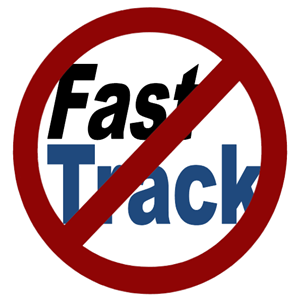
When trade adjustment assistance came to the floor of the House, it failed miserably, by a vote of 126 to 302, owing largely to bipartisan objections to the measure.
Originally, the provision — a bailout to labor union members purportedly dislocated by the Trans-Pacific Partnership — was going to be paid for in part by cutting $700 million from Medicare in 2025. But Democrats objected.
So the House in a separate vote stripped the Medicare cuts out, and instead replaced it, in part, with $136 million of “Penalty for Failure to File Certain Returns,” according to the Congressional Budget Office (CBO), in the trade preferences bill.
As Sen. Rand Paul (R-Ky.) explained to Breitbart News, “To get the money, under our budget rules, we have to pay for it — so they want to pay for it with a fine on small businesses… this is similar to the fines they wanted to do in Obamacare with 1099s and there was such an outcry it’s the only part of Obamacare we ever repealed.”
Rep. Ken Buck (R-Colo.) went further, telling Breitbart News, “I think anytime the government requires people to send money, it’s a tax.”
Buck added, “You can use fines and fees and other words to define something, but when you’re trying to get people to give more money to the government it seems to be something that is going to hurt small businesses and ultimately I think it will be part of the reason why it’s going to be unpopular and even more unpopular when people find out what exactly the mechanism is for paying for this.”
So, is it a fine? Or a tax increase?
Bottom line is the trade preferences bill — which modified the trade promotion bill still under consideration and is considered as a part of the overall deal — increases penalties on erroneous tax returns to, in part, pay for trade adjustment assistance.
Members can decide for themselves if that’s something they support. Some of them, like Rep. Buck, clearly do believe it is a tax increase.
But the revenue increases do not end there. Section 602 of the trade preferences bill appears to be a $3.8 billion direct tax hike as it requires businesses and the self-employed to pay an extra 5.25 percent in estimated taxes in 2020, CBO reports. A similar provision in trade promotion authority increases revenues by $1.9 billion in 2020, again from CBO.
Interestingly, the increased corporate estimated tax is all given back in 2021, indicating the 2020 provision is simply a temporary tax increase to pay for part of the trade adjustment assistance. Perhaps Congress thinks of it as a compulsory 1-year interest free loan rather than a tax hike. Whatever.
All this, supposedly, to win over Democrats skeptical of granting trade authority by giving a constituent group of theirs, labor unions, trade adjustment assistance.
Yet the strategy backfired. Democrats led by House Minority Leader Nancy Pelosi (D-Calif.) ardently opposed trade adjustment assistance, intent on killing the entire deal.
Now, the bill — without the trade adjustment assistance provision approved — hangs in limbo, with Democrats opposed and Republicans wary of granting a bailout to big labor paid for with any tax provisions.
Leaving leadership between a rock and a hard place, and any vote in serious doubt.
Robert Romano is the senior editor for Americans for Limited Government.






